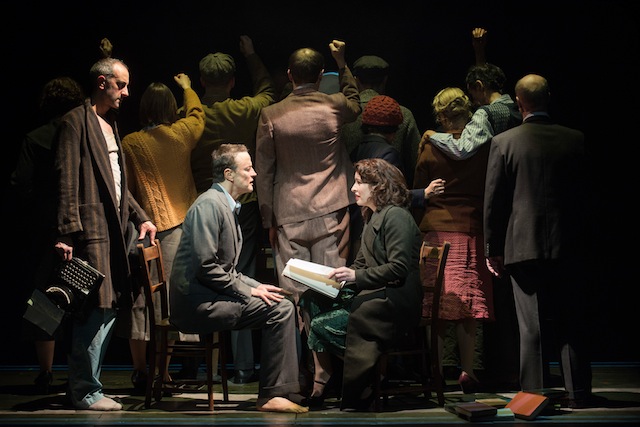The Master and Margarita, Complicite/Simon McBurney
Barbican, London
Adapting Mikhail Bulgakov’s Stalin-era dissident novel for the stage is not what you’d describe as taking the easy road. But then again Simon McBurney doesn’t usually plump for the obvious, having, in the past, chosen texts by a range of writers from Junichiro Tanizaki through Haruki Murakami to Bruno Schultz, always to wonderful effect, and affect. Yet after McBurney decided that moving Bulgakov’s masterpiece to the stage was a a good idea he began to have ‘Terrible dreams. Nightmares. Waking up in terror nightly.’ Little wonder…
The Master and Margarita has been described by the New York Times as ‘a concerto played simultaneously on the organ, the bagpipes, and a pennywhistle, while someone sets off fireworks between the players’ feet.’ Written between 1928 and 1940 during the harshly repressive times of Stalin, and therefore studiously hidden, it didn’t see the light of day until a monthly magazine, Moskva, carried the first part in its November 1966 issue. Straight off it sold 150,000 copies. A vibrant, magical Russian classic went to meet its readers. Including McBurney.

copyright Hugo Glendinning
The book – and thus the theatre piece – weaves incredibly disparate strands, with segues between madcap Moscow and Jerusalem in the time of Jesus. Even with a great deal of deft doubling-up this meant assembling a stalwart cast of sixteen players, with Paul Rhys and Susan Lynch as the eponymous pair, the writer and his lover at the pulsing, mad heart of things. Lynch, in particular has a physically taxing second half, in which she makes a Faustian pact and dances with the devil, murderers, dupers and dissolute folk, and does so with wild abandon, or maybe careful guile, as she’ll do whatever it takes to be reunited with the Master. It would be invidious to single out any of the other players as they all gave their all in a long, long performance. I’ll just throw them a bouquet, which then turns into a swan.
One minute we were in the Spartan chill of the Stravinsky Clinic where mental health issues are treated with a Stalinist brusqueness, the next we’re watching black magic shows in a Muscovite Variety Theatre.
It’s now a given that Complicite’s sure sense of technology and theatrical possibility will allow them to put pretty much anything on stage, using an array of devices from simple puppetry to camera wizardry. But designer Es Devlin created nothing short of a built triumph – of bricked up windows, crumbling and literally cracking tenements, melding two dimensions of stage set so that they easily transmuted into the third dimension of imagination. One minute we were in the Spartan chill of the Stravinsky Clinic where mental health issues are treated with a Stalinist brusqueness, the next we’re watching black magic shows in a Muscovite Variety Theatre. Crammed trams traverse streets before they turn into ticket booths. Overlain with Google Earth graphics and specially created video the production was nothing short of total phantasmagoria, entirely in keeping with the book, but with its own life too, from anachronistic gags about iPhones to the real sense that we, too have our surveillances to ponder, even if it’s more benign, the watching, Google eye rather than Stalin’s thugs.
Next year this company celebrates thirty years of theatre making. They have so much beauty, magic and intelligence to look back on.
When The Master and Margarita finished, with the third, stunning coup de théâtre in a row – as the lovers were floated into space and took their places among the stars – I didn’t want the applause to start, wanting to savour the quivering moment. When the firecracker clapping did start I resented it, its intrusion, the fact that someone was stopping me reading, my complete immersion in my Russian novel. I remember the self-same feeling when I saw Complicite’s Street of Crocodiles, never wanting to leave the theatre, its embrace of magic, its perfect pact and collusion between company and audience. Long, long may McBurney and his close collaborators continue to dole out the gifts.











